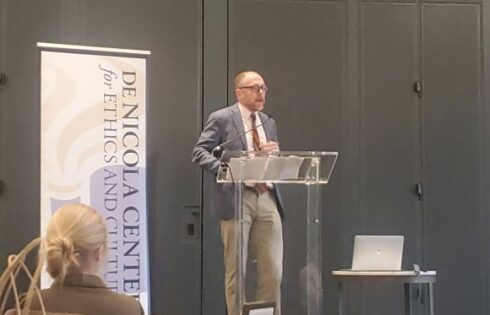
A “Men in Literature” course taught successfully for eight years at Springfield College has now been canceled after campus officials complained the class was too focused on men.
The popular humanities department-approved course was taught by Dr. Dennis Gouws. Campus leaders, prior to axing the course, accused the scholar of turning the English class into something of a men’s gender studies class.
In return, Gouws changed the curriculum to appease campus leaders’ concerns — to no avail. Today he accuses campus leaders of playing politics and undermining academic freedom.
“Faculty members and college administrators should make those decisions … on the basis of legitimate educational principles, not political ideology,” Gouws said in an interview with The College Fix.
The National Association of Scholars, an organization dedicated largely to defending academic freedom, has since come to the defense of Gouws.
In an April letter to Springfield College, association President Peter Wood points out that the school offers plenty of classes similar to “Men in Literature,” including Native American Literature, Asian American Literature and Women and Literature, the latter of which has an emphasis “on the cultural position of women in the United States, emphasizing racial, ethnic, and class diversity.”
“We are not of the view that once a course has been approved and taught it is necessarily eternal,” Wood wrote. “But decisions over curricular matters should be grounded in principles that are clear, transparent, and relevant.”
When Gouws had changed his course to address concerns, he had added more traditional literature like F. Scott Fitzgerald’s The Great Gatsby and Andy Weir’s The Martian.
The dean, Anne Herzog, deemed these changes insufficient and canceled the course, according to the NAS report.
Perhaps not coincidentally, Herzog and Gouws fractious interactions predate the “Men in Literature” situation. Herzog had previously denied a request for sabbatical leave for Dr. Gouws in 2014, and had also reprimanded him in an e-mail for missing a “sexual harassment prevention” training to which he had already been excused, the report also said.
What’s more, when Gouws had put up a poster in 2013 bringing awareness to false rape accusations, college officials reported a complaint about the posters contributing to a “hostile environment.” Dean Herzog then declared the group behind the poster, A Voice for Men, a hate group. She cited the Southern Poverty Law Center, an organization famous for labeling many groups that aren’t sufficiently liberal “hate groups.”
In the letter Springfield College sent back to the National Association of Scholars, the school claims Gouws has been uncooperative in the dispute and unwilling to meet.
This appears to have bothered Gouws precisely because he claimed to college officials and in an interview with The College Fix to have had many experiences where representatives of the college said one thing in person and another in writing. (His full response can be found here.)
Gouws has also expressed regret that the college referred the dispute to the college’s attorney, since it is no attorney’s role to determine what courses should or should not be taught.
As for additional motivation behind the decision to ax “Men in Literature,” in a March 15 letter to Gouws from Provost Dr. Jean Wyld, she expressed concern about an assignment in Gouws’s composition course requiring students to write about males in their educational environment as “a concern from an academic and even legal perspective.”
She did not expand on the legal threat.
The association relates the “witch hunt” atmosphere of college campuses and sexual assault to the way to college has treated Gouws. Though the letter does not directly refer to the word “feminism,” the letter also floats the idea that the college wanted to get rid of the course as a precaution to a Title IX complaint.
Ashley Thorne, executive director of the National Association of Scholars, echoed this notion in an interview with The College Fix.
“I think they’re scared of a [Title IX] violation though they haven’t said so explicitly,” she said, adding that since federal funds are tied to Title IX, it can be a serious cause for concern.
Like The College Fix on Facebook / Follow us on Twitter
IMAGE: Shutterstock





Please join the conversation about our stories on Facebook, Twitter, Instagram, Reddit, MeWe, Rumble, Gab, Minds and Gettr.